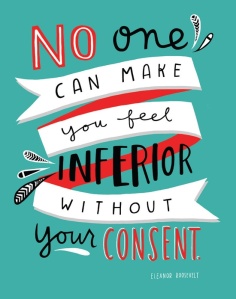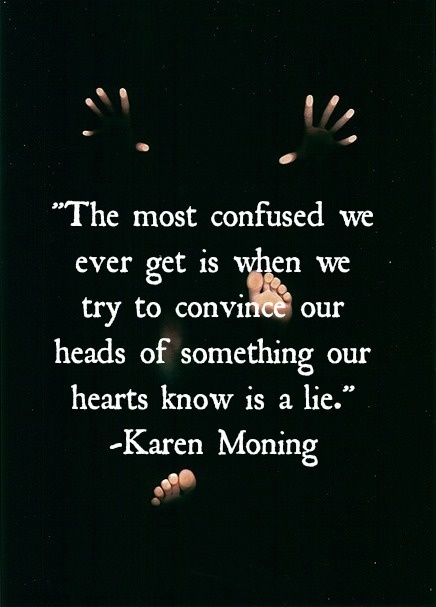Tagged: Self-help
Mission Above All Else. No Excuses.
Your mission statement, either your personal one or the one used by your organization, should be the guiding force behind all your decision making.
It’s usually when I make a grand and sweeping statement like this when my clients start to get their tail feathers ruffled. You might think we where shooting a toilet paper commercial because of the parade of “buts” that follow. For example, in this case, I might hear something along the lines of “But if times are constantly changing, then shouldn’t we bend our mission from time to time?” or my favorite, “But my budget won’t allow me/us to do the work of our stated mission?”
Simmer down folks and listen up. It’s time we had a heart to heart about what mission statements are and how they are intended to be used. Mission statements are supposed to be your North Star when it comes to decision making in your career or for your organization. Here are a few helpful thoughts to consider when examining your mission statement:
1.) Listen to the buts. If you find yourself constantly trying to reason your way around your organizational or personal stated mission– then maybe you need to re-examine the mission itself. In order to do take a second look at your mission statement and successfully determine whether or not your mission is effective, you will need to ask some important questions.
2.) What is the work we/I do? This is where you’ll need to get serious and specific. For this program, or specific organization– what exactly is the artistic work you are doing? Spell it out. You might feel that you are limiting yourself, but I’d like for you to reframe your specificity as a way of focusing your efforts and putting the odds for success more in your favor.
3.) Determine who are your real stakeholders. That means not just the people you think you are working with such as audience members and your performers. I mean EVERYBODY. Vendors, audience members by different types, local businesses associated with you, people in your outreach/engagement work, coworkers, friends, spouses and family— create a brainstorm map with you at the center and everyone else your work is connected to radiating from it. You’ll be surprised to discover that your artistic work may affect many more people than you had originally considered.
4.) Make sure the nuts and bolts are all there. Your mission statement is not like Ikea furniture, and thus it should be made for the long term and not the short term. Your mission statement should include your unchanging values about the work you are doing, as well as a clearly defined purpose for your organization’s existence. (Or more simply, why do you do the work you do?). Here’s a hint– don’t be vague or ambiguous. If you can’t articulate how the artistic work you do fills a specific need, no one else will be able to guess it for you. You might also want to include a brief statement about the vision you have for how your work will impact the need you have outlined over the course of the future. This helps others to imagine the logical progression of the work you are doing.
5. Lastly, stick to the plan. Your refined mission statement can now act as a litmus test for all your other decisions. Consider your mission and ask yourself, “If I choose A, does this serve my stakeholders? Is it directly related to the work we do? Is this decision in line with my values?” Sticking to your mission helps you to make strong and decisive answers to the questions you will face in your path, even when the right answer may be uncomfortable.
So remember folks, your mission is what it’s all about.
Stay tuned,
John-Morgan

4 Ways to Deal With Criticism– and Win.
 As a performing artist, you are going to face opposition. Sometimes it can be constructive, sometimes you may want to crawl under a rock. Criticism may come from others, and more often than not, it may come from within you. When you are faced with criticisms coming at you from many sources at once you have a choice: either be blown away or lean into the wind.
As a performing artist, you are going to face opposition. Sometimes it can be constructive, sometimes you may want to crawl under a rock. Criticism may come from others, and more often than not, it may come from within you. When you are faced with criticisms coming at you from many sources at once you have a choice: either be blown away or lean into the wind.
That’s right, you have the power to decide how you will let criticism affect you. Most people don’t know this. For some reason, so many artists immediately defer to their critics rather than simply not accept the criticism. Very few of us know that we don’t have to validate someone else’s criticism. Today, we’ll look at some powerful tools with which you can protect your artistic growth and integrity in a storm of tough criticism.
4 Ways to Deal With Criticism:
1. Consider the source. This is best way to protect yourself from 90% of negative criticism. Don’t let people who have no influence over you or your career make decisions for you. Ask yourself, does this person have a personal stake in your long-term success? If the answer is no, then don’t give them the time of day. If the answer is yes, move to step no. 2…
2. Strip the criticism of emotion. Take out a sheet of paper, and write the criticism down. For example, after slaving away for a lesson, your teacher might say to you–
“Please don’t come to your lesson without having looked at your music. Don’t waste my time.”
Now let’s get rid of the emotional content:
“Please don’t come to your lesson without having looked at your music. Don’t waste my time.”
3. Take the “meat” of the criticism and explore it. Clearly there was a misunderstanding about how much work you put into your lesson preparation. This is where you make your decision– either you kill your momentum by letting your teacher upset you or you turn this into an opportunity for your growth.
4. The last step in the process is to be proactive. Harsh criticism can become toxic to us if they go unchecked for a long time. They sit in the dark recesses of our self-concept and seep out negative thoughts. Don’t allow the situation to get like that! Confront your critics. Ask them to explain themselves and fully outline their criticism. If they can’t defend it, then you don’t have to acknowledge it.
Try to employ these 4 steps the next time you encounter some harsh words from others. You’ll find that when you gain the ability to disregard only but the most meaningful and constructive critiques, you will find yourself in a much happier place. Remember, critics can be tough, but you can always be tougher.
Stay tuned,
John-Morgan
Related articles
- Why We Need to Have Compassion for Our Inner Critic (toddlohenry.com)
- Can You Make Criticism Your Friend? Yes. And Here’s How. (algumwood.com)

